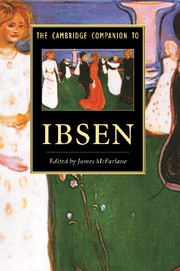Book contents
- Frontmatter
- 1 Ibsen's dramatic apprenticeship
- 2 Ibsen and historical drama
- 3 Dramatic and non-dramatic poetry
- 4 Ibsen and comedy
- 5 Ibsen and the realistic problem drama
- 6 Ibsen and feminism
- 7 The middle plays
- 8 The last plays
- 9 Ibsen's working methods
- 10 Ibsen and the theatre 1877-1900
- 11 Ibsen and the twentieth-century stage
- 12 Ibsen on film and television
- 13 On staging Ibsen
- 14 Ibsen and the drama of today
- 15 A century of Ibsen criticism
- 16 Works of reference
- Index
5 - Ibsen and the realistic problem drama
Published online by Cambridge University Press: 28 May 2006
- Frontmatter
- 1 Ibsen's dramatic apprenticeship
- 2 Ibsen and historical drama
- 3 Dramatic and non-dramatic poetry
- 4 Ibsen and comedy
- 5 Ibsen and the realistic problem drama
- 6 Ibsen and feminism
- 7 The middle plays
- 8 The last plays
- 9 Ibsen's working methods
- 10 Ibsen and the theatre 1877-1900
- 11 Ibsen and the twentieth-century stage
- 12 Ibsen on film and television
- 13 On staging Ibsen
- 14 Ibsen and the drama of today
- 15 A century of Ibsen criticism
- 16 Works of reference
- Index
Summary
FREEDOM, TRUTH AND SOCIETY - RHETORIC AND REALITY
During the night of 9 January 1871, a young Dane lay awake in his hospital bed in Rome writing. He was committing to paper a poem to which he had given the title 'To Henrik Ibsen'. He had recently received a letter from Ibsen - a letter carrying a powerful appeal to him to put himself at the head of the 'revolution of the human spirit' which the age cried out for. In the poem which formed his enthusiastic response, the young Dane - the critic Georg Brandes (1842-1927) - described how all those mendacious and authoritarian forces of the contemporary age would be brought low when 'the intellectuals' made their revolt. And he raised the banner of freedom and progress with the words: 'Truth and Freedom are one and the same.'
Time after time in the years that followed, Ibsen was himself to raise this same revolutionary banner - with truth and freedom as the central watchwords. In later years these concepts could sound both abstract and ambiguous; nevertheless, within their historical context, they served as a battle cry in the struggle against the prevailing situation. 'Truth' alone - that truth of the new age such as a Brandes and an Ibsen saw it — could achieve liberation. Without truth there could be no change, no genuine 'freedom'.
- Type
- Chapter
- Information
- The Cambridge Companion to Ibsen , pp. 68 - 88Publisher: Cambridge University PressPrint publication year: 1994
- 4
- Cited by



